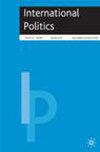From cooperation to confrontation: US-Russia relations since 9/11
IF 0.9
Q2 INTERNATIONAL RELATIONS
引用次数: 0
Abstract
Abstract Relations between the US and Russia during the George W. Bush era were marked by a dramatic shift from cooperation to confrontation. Russia’s unequivocal support for the US-led War on Terror in the wake of the 9/11 attacks in 2001 gave way to a sustained rise in anti-Western sentiment in the Russian political narrative. This article analyses US-Russia relations during the presidency of George W. Bush through the lens of great power relations and status. It explores the distinctive aspects of the Bush administration’s foreign policy approach and how they impacted the US-Russia relationship: notably increasing US unilateralism and its apparent rejection of multilateralism, liberal interventionism and the pursuit of democracy promotion around the world. These continue to shape the Russian view of the US, its intentions and attitude towards international order.从合作到对抗:9/11以来的美俄关系
在乔治·w·布什(George W. Bush)时代,美俄关系发生了从合作到对抗的戏剧性转变。2001年9/11恐怖袭击后,俄罗斯对美国领导的反恐战争的明确支持,让位于俄罗斯政治叙事中反西方情绪的持续上升。本文从大国关系和大国地位的角度分析了小布什总统任期内的美俄关系。它探讨了布什政府外交政策方法的独特方面,以及它们如何影响美俄关系:特别是美国单边主义的增加,以及它对多边主义的明显拒绝,自由干涉主义和在世界范围内追求民主推广。这些因素继续影响着俄罗斯对美国的看法、美国对国际秩序的意图和态度。
本文章由计算机程序翻译,如有差异,请以英文原文为准。
求助全文
约1分钟内获得全文
求助全文
来源期刊
CiteScore
3.10
自引率
7.10%
发文量
47
期刊介绍:
International Politics?is a leading peer reviewed journal dedicated to transnational issues and global problems. It subscribes to no political or methodological identity and welcomes any appropriate contributions designed to communicate findings and enhance dialogue.International Politics?defines itself as critical in character truly international in scope and totally engaged with the central issues facing the world today. Taking as its point of departure the simple but essential notion that no one approach has all the answers it aims to provide a global forum for a rapidly expanding community of scholars from across the range of academic disciplines.International Politics?aims to encourage debate controversy and reflection. Topics addressed within the journal include:Rethinking the Clash of CivilizationsMyths of WestphaliaHolocaust and ChinaLeo Strauss and the Cold WarJustin Rosenberg and Globalisation TheoryPutin and the WestThe USA Post-BushCan China Rise Peacefully Just WarsCuba Castro and AfterGramsci and IRIs America in Decline。

 求助内容:
求助内容: 应助结果提醒方式:
应助结果提醒方式:


